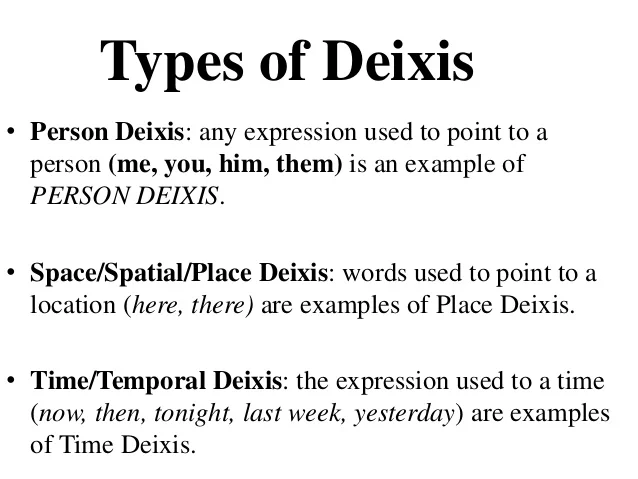Pragmatics
I. Invisible Meaning:
Pragmatics focuses on how different factors can affect the interpretation of meaning in communication or reading. Factors include intentions of speakers, the relationship between a speaker and listener, and the scenarios that can change the context of a message.
II. Context:
To understand the context of something, people can not solely rely on the literal meaning of words. Instead, when interpreting the meaning, it is important to consider multiple elements and judge them more broadly to fully understand the intention mentioned by the writer or speaker.
*Deixis:
Deixis or deictic expressions is a term use for words that is used to point to people (you, me, us, them), places (here, there, over there) and times (now, last time, next time). All these deictic expressions are interpretated in term of what person, places or times the speaker has in mind, and usually vague if we don't know the context of them before.
III. Reference:
Reference acts as a representative of a thing or a person mentioned by the writer or speaker to enable the reader or listener to identify them. We can use proper nouns (names), nouns in phrases or pronouns as a reference. It is also important to consider the context and person using it to identify what or who the reference refers to.
*Inference:
Inference is the use of additional information associated with things to refer to people and use names of people to refer to things. For example:
-"Where's the spinach salad sitting?" => "spinach salad" refers to the person who order spinach salad.
-"Can I look at your Chomsky?" => "Chomsky" refer to a book wrote by an author named Chomsky.
*Anaphora:
Is the use of a word or phrase to refer back to another word first mentioned. Words that are used early in a text to represent a person or object are called antecedents, words that mention or refer to earlier words are anaphoric expressions. For example:
-"I use a fishing rod to catch cods, but it is broken because those fishes are quite strong."
Antecedants: fishing rod, cods.
Anaphoric expressions: it, those fishes.
IV. Presupposition:
Is the assumptions of a speaker (writer) which are true or known by a listener (reader).
V. Pragmatics Markers:
Phrases used to express the speaker's attitude without changing the original context in a speech, and maintain the flow of the conversation. These phrases include "you know" to indicate the mentioned information can be shared, "I mean" to indicate self-correct or to clarify something.
V. Politeness:
Can be defined as showing awareness and consideration of another person's face.
*Face-threatening act: Is when you say someting that can be considered as a threat to another person self-image. Some FTA requests often begin their sentences with a verb, which indicates the person who asks behaving like they are above everybody else.
*Face-saving act: By removes the assumption of social power, the request you made will be less threatened to the other self-image.
*Negative and Positive Face:
-Negative face: Emphasize the concern about imposition (I'm sorry to bother you...; I know you are busy but...)
-Positive face: Emphasize solidarity and draw attention to a common goal (The same thing happened to me...; Let's do this together...)
VI. Speech Acts:
The term is used to describe an action that involved some body movement while speaking such as making a request, command, question or inform for somebody.


Nhận xét
Đăng nhận xét